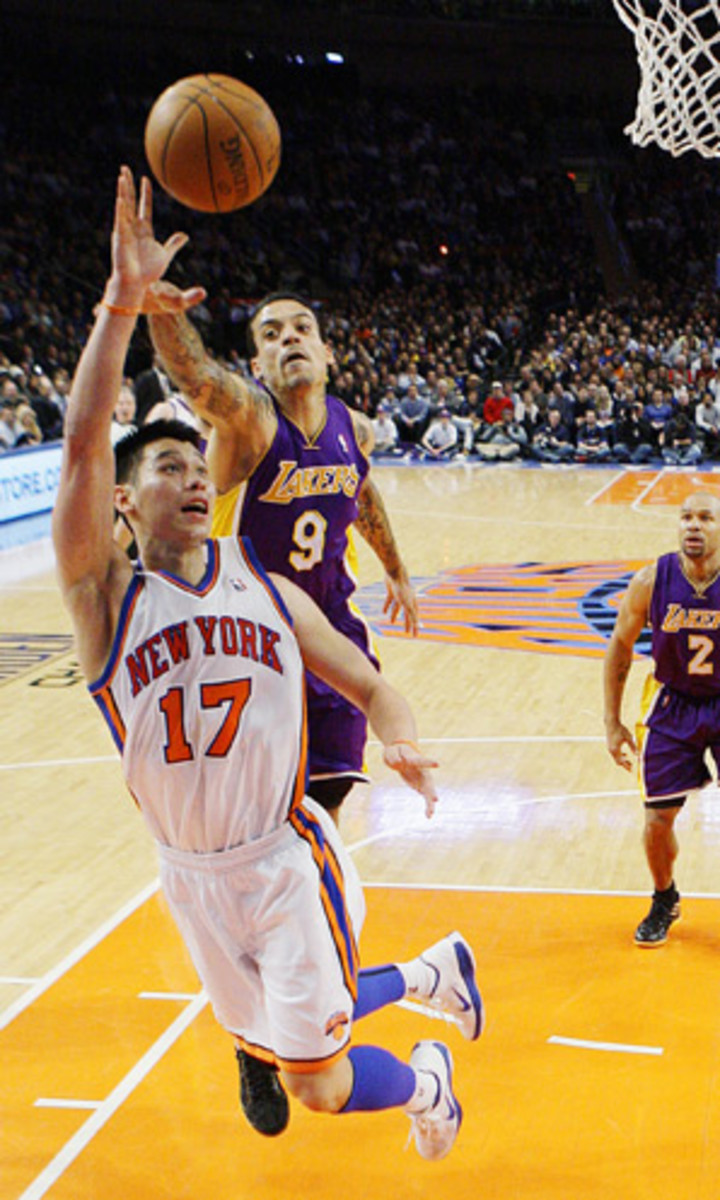Two weeks of Jeremy Lin's rise a period that we'll never forget
The strangest thing about last Friday's agreement between Time Warner Cable and the MSG Network -- which put Knicks basketball back on television for two million New York-area subscribers for the first time in 48 days, just in time to watch Jeremy Lin's first loss as a starter -- is that it felt somehow disappointing. That, in some ways, it marked the end of the first stage of the Lin phenomenon, the experience of which was, in New York and its environs and beyond, at once old-fashioned, distinctly modern and wholly exhilarating.
In New York, all those blacked-out TV screens meant that even if you couldn't afford to take in Lin's feats in person at Madison Square Garden, watching him play meant doing so communally. It called to mind the pre-Pay-Per-View days, when people would gather to be amazed by another three-lettered hero, Muhammad Ali, on simulcast. You phoned bars to see if they would be showing the game. You went over to the apartments of friends who happened to possess either a satellite dish or the technological savvy and just-questionable-enough ethics to unearth pirated interned streams. The NBA's lockout-necessitated accelerated schedule meant that you did this every night, it seemed. The six games Lin started and won, after his bolt-from-the-blue breakout off the bench and before the corporate behemoths finally found a way by which they could recommence mutually profiting off New Yorkers, came in the span of just 10 days.
Lin's rise was not a communal experience for only New Yorkers, though, due in large measure to Twitter, which seemed even more ideally suited to its explosive speed than to the once-a-week exploits of another recent phenomenon, Tim Tebow. People often blithely credit Twitter both too much and not enough for its role in the world, from aiding political revolutions to being the first place to learn which celebrities are dead (who are actually alive), and which are alive (but are actually dead). With Lin, though, it was perfect, and did far more than turn everyone into budding Oscar Wildes, punsters committed to demonstrating the astonishing number of words that can be mangled to include his last name.
Lin's own account -- @jlin7 -- is as earnest as the 23-year-old himself ("Gutsy win ...5 in a row!"), although his followers count has predictably spiked, from 30,164 as of Feb. 4 to 497,232 and counting. But the real beauty of Twitter and Lin was the worldwide discourse about him that only it can facilitate. He grew up in Silicon Valley -- in Palo Alto -- but, in many ways, he was made on Twitter, 140 characters at a time. Those who couldn't watch him play, in New York or elsewhere, could mourn the end of Lin with instant reports of every turnover -- and there have been a lot of turnovers -- and exult, after a refresh, in his rebirth thanks to descriptions of another helter-skelter drive to the rim.
The truly remarkable thing, though, was how Twitter propelled Lin's legend and allowed him to belong to everyone. The company says that its users issued more than five million tweets referring to him since Feb. 4, and they came not just from New Yorkers and NBA wonks. Yes, here was his teammate Landry Fields tweeting a photo of the sofa on where Lin had been sleeping, allowing it to takes its place with Dr. Freud's among the World's Most Famous Three-Seaters. And here was Rockets GM Daryl Morey bemoaning his decision to release him in December ("We should have kept @jlin7. Did not know he was this good.") Between Feb. 6 and Feb. 14, according to the analytics company General Sentiment, Lin was mentioned on social media and Twitter not only more than any other NBA player, but also more than Barack Obama.
It makes sense. It sounds silly to ape the slaves of Rome and assert things like, we are all Jeremy Lin. But here it is: we are all Jeremy Lin. Yes, Asians, Christians and Ivy Leaguers have all, rightfully, come to identify with him. But so too have people of any minority, of any type. So too have lifelong New Yorkers, as well as anyone who has just moved there, or to anywhere, to try to make a go of it. So too has anyone who has ever been told that he or she is not good enough to do something that he or she knows that he or she can do. So too has, pretty much, everyone.
It is, undoubtedly, a good thing that Lin and the Knicks are back on TV. Now New Yorkers can see for themselves, whenever they want, how, for example, he meshes with the back-from-injury Carmelo Anthony. But as you watch, perhaps alone in your darkened living room, his seemingly inevitable transition from phenomenon to effective NBA point guard, checking your Twitter stream to confirm that all of the puns have finally been used up, you might think back, almost wistfully, to the beginning, when your TV screen was dark. You will certainly remember those two weeks. We will probably never have two weeks like them again.






